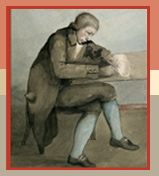
Other works
A Short Account of the Ancient British Bards
Autobiographical material by Iolo Morganwg
Y Bardd yn Dychwelyd i Forgannwg Wedi bod Flynyddau lawer yn Lloegr
Barddoniaeth Dafydd ab Gwilym (1789)
Dagrau yr Awen neu Farwnad Lewis Hopcin Fardd, o Landyfodwg ym Morganwg
The Heroic Elegies of Llywarç Hen (1792)
Introduction to The Myvyrian Archaiology of Wales:
Letter to the Gentleman's Magazine (1789)
Lewis Morris, Sarcasm on Cardigan
The Myvyrian Archaiology of Wales (1801–7)
Plan of the Analytical Dissertation on the Welsh Language, by E.W.
Poems, Lyric and Pastoral (1794)
The Primacy of South Wales (NLW 13128A, p. 302)
Salmau yr Eglwys yn yr Anialwch
Cyfrinach Beirdd Ynys Prydain (1829)
Iolo had intended 'Cyfrinach Beirdd Ynys Prydain' (The Secret of the Bards of the Island of Britain) to be the centrepiece of 'The History of the Bards', but he did not live to see it through the press, and Cyfrinach Beirdd Ynys Prydain (1829) was finally published posthumously. Written mainly during the year he spent in Cardiff gaol from 1786 to 1787, this was the first 'bardic' text that he fabricated.
'Cyfrinach Beirdd Ynys Prydain' is a highly original metrical treatise and reveals that Iolo was indeed the main authority of his generation on Welsh metrics. He combined authority with ingenuity, for his particular classification was structured along guidelines established by the botanist Linnaeus.
The Welsh metres which had been classified and standardized by Dafydd ab Edmwnd (fl. 1450–97) and accepted at the eisteddfod hosted by Gruffydd ap Nicholas at Carmarthen c.1453 had become renowned for their technical complexity in subsequent centuries. But in 'Cyfrinach Beirdd Ynys Prydain' Iolo rejected Dafydd ab Edmwnd's standards and reclassified the Welsh metrical system. He reinstated some ancient strict-metre forms, fashioned new ones and also forged supporting examples which he attributed to Glamorgan bards.
By 1791 the so-called Glamorgan system was at the heart of Iolo's bardo-druidic vision of the past, and conferred ancient authority (and thence superiority) on the literary tradition of his native county. He now argued that 'Cyfrinach Beirdd Ynys Prydain' was proof that the poets of north Wales had fallen away from the true bardic path and descended into barbarism, while the genuine tradition of Bardism prevailed in south Wales under the aegis of the Glamorgan bards.



